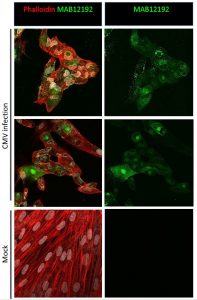
Immunofluorescence data: Human Fibroblasts were seeded on coverslips and infected with Cytomegalovirus (CMV) for 96 h at MOI 0.1. Control coverslips consisted of uninfected fibroblasts. After fixation with 4% PFA, samples were stained with the antibody (MAB12192). Antibody was used at a dilution of 1:500 and Triton X-100 was used as detergent. Imaging was performed using a Leica SP5 confocal microscope (Image by Virology Research Services Ltd).
See our blog for more information.
MOUSE ANTI-CYTOMEGALOVIRUS GLYCOPROTEIN B ANTIBODY (0811)
Mouse anti Cytomegalovirus glycoprotein B antibody recognises Human Cytomegalovirus glycoprotein B antigen. The Cytomegalovirus glycoprotein B antibody is suitable for immunoassay research and development.
PRODUCT DETAILS – MOUSE ANTI-CYTOMEGALOVIRUS GLYCOPROTEIN B ANTIBODY (0811)
- Mouse anti-CMV Glycoprotein B monoclonal IgG1 antibody (clone 0811).
- Greater than 90% purity by SDS-PAGE and buffered in PBS, pH7.2.
BACKGROUND
Human Cytomegalovirus (HCMV) is an enveloped, double stranded DNA virus that belongs to the family Herpesviridae. The human CMV virus is ubiquitous and HCMV infection is globally widespread. The virus can be transmitted through direct contact with infected bodily fluids or though contact with virus infected transplant and transfusion material. Human CMV can also be transferred in utero from mother to foetus during pregnancy resulting in congenital HCMV infection of the newborn.
Individuals can be re-infected by the same strain or by a different strain of HCMV. Once infected the virus remains latent in an individual and may reactivate later in life. In developed countries, 50 to 70% of all adults are thought to be HCMV sero-positive. Reports suggest that HCMV sero-prevalence increases with age, ethnicity, low socioeconomic status and sexuality.
In healthy adults and children, HCMV infection is self-limiting with most cases being asymptomatic or presenting with mild, non-specific or mononucleosis-like symptoms. However, HCMV can cause severe clinical disease in immunocompromised patients. Congenital HCMV infection can lead to birth defects such as blindness, deafness, mental impairment, epilepsy and microcephaly.
Human CMV has the largest genome of any known human virus. The HCMV genome encodes numerous glycoproteins including structural glycoproteins gB, gH, gL, gO, UL128, UL130 and UL131, which are conserved between members of the family Herpesviridae. Cytomegalovirus glycoprotein B (gB) is an HCMV envelope glycoprotein that is essential for viral entry into host cells. The protein is a major viral immunogen, eliciting a strong immune response, and has been the target of vaccines designed to prevent HCMV infection by preventing entry into host cells. However, the HCMV pentameric complex (gH/gL/UL128/UL130/UL131) also acts as a receptor for host-cell entry into epithelial and endothelial cells, and vaccine results using gB alone have only shown partial success.
REFERENCES
- Burke HG, Heldwein EE. (2015). Crystal Structure of the Human Cytomegalovirus Glycoprotein B. PLoS Pathog. Oct 20;11(10):e1005227.


